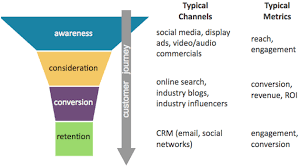The Power of Online Marketing Analytics
In today’s digital age, online marketing analytics have become essential tools for businesses looking to maximise their online presence and drive success. By utilising data-driven insights, businesses can gain a deeper understanding of their audience, track the performance of their marketing efforts, and make informed decisions to optimise their strategies.
Understanding Your Audience
Online marketing analytics provide valuable information about your audience demographics, behaviour patterns, and preferences. By analysing this data, businesses can create targeted campaigns that resonate with their target market, leading to higher engagement and conversion rates.
Tracking Performance
With online marketing analytics, businesses can track the performance of their campaigns in real-time. From website traffic to social media engagement and email open rates, these insights help businesses monitor the effectiveness of their marketing efforts and make adjustments as needed to improve results.
Optimising Strategies
One of the key benefits of online marketing analytics is the ability to identify what works and what doesn’t in your marketing strategies. By analysing data on campaign performance, customer interactions, and conversion rates, businesses can refine their strategies for better outcomes and higher ROI.
Measuring Success
Online marketing analytics provide measurable results that allow businesses to gauge the success of their campaigns accurately. Whether it’s tracking sales conversions or monitoring website traffic growth, these metrics help businesses assess their performance and make data-driven decisions for future initiatives.
The Future of Online Marketing
As technology continues to evolve, online marketing analytics will play an increasingly vital role in shaping the future of digital marketing. Businesses that leverage data insights effectively will have a competitive edge in reaching their target audience, driving engagement, and achieving business growth.
Embrace the power of online marketing analytics today to unlock new opportunities for your business’s online success.
Eight Key Benefits of Online Marketing Analytics for Business Success
- 1. Data-driven insights for informed decision-making.
- 2. Targeted campaigns to reach the right audience.
- 3. Real-time tracking of marketing performance.
- 4. Improved understanding of customer behaviour and preferences.
- 5. Ability to measure and analyse campaign success accurately.
- 6. Cost-effective way to optimise marketing strategies.
- 7. Enhanced ROI through data-driven optimizations.
- 8. Competitive advantage in the digital marketplace.
Seven Drawbacks of Online Marketing Analytics: Navigating Data Overload, Privacy Issues, and More
- 1. Data Overload
- 2. Privacy Concerns
- 3. Costly Tools
- 4. Skill Requirements
- 5. Time-Consuming
- 6. Inaccurate Data
- 7. Overreliance on Data
1. Data-driven insights for informed decision-making.
Online marketing analytics offer a significant advantage through data-driven insights that enable businesses to make informed decisions. By analysing key metrics such as audience demographics, engagement rates, and conversion data, businesses can gain valuable insights into the effectiveness of their marketing strategies. This wealth of information empowers decision-makers to adjust their tactics, allocate resources more efficiently, and tailor their campaigns to better meet the needs and preferences of their target audience. Ultimately, leveraging data-driven insights from online marketing analytics leads to smarter decision-making and more successful outcomes in the competitive digital landscape.
2. Targeted campaigns to reach the right audience.
Online marketing analytics empower businesses to create targeted campaigns that effectively reach the right audience. By analysing data on audience demographics, behaviour, and preferences, businesses can tailor their marketing messages to resonate with specific segments of their target market. This precision targeting not only increases the likelihood of engaging with the right audience but also improves conversion rates by delivering relevant content to those most likely to respond positively. Ultimately, targeted campaigns enabled by online marketing analytics help businesses maximise the impact of their marketing efforts and drive success in reaching their desired audience.
3. Real-time tracking of marketing performance.
Online marketing analytics offer the invaluable advantage of real-time tracking of marketing performance. This means that businesses can monitor the effectiveness of their marketing campaigns as they unfold, allowing for immediate adjustments to be made based on live data insights. By having access to up-to-the-minute information on key metrics such as website traffic, social media engagement, and conversion rates, businesses can make informed decisions promptly to optimise their strategies for maximum impact and ROI. This real-time tracking capability empowers businesses to stay agile and responsive in their marketing efforts, ensuring they are always on top of their game in the dynamic digital landscape.
4. Improved understanding of customer behaviour and preferences.
Online marketing analytics offer businesses a significant advantage by providing an enhanced understanding of customer behaviour and preferences. By analysing data on how customers interact with online platforms, businesses can gain valuable insights into what drives customer decisions, preferences, and actions. This deeper understanding enables businesses to tailor their marketing strategies to better meet customer needs, increase engagement, and ultimately drive conversions. With this knowledge at their fingertips, businesses can make informed decisions that lead to more effective and targeted marketing campaigns that resonate with their target audience.
5. Ability to measure and analyse campaign success accurately.
One significant advantage of online marketing analytics is the ability to measure and analyse campaign success accurately. By tracking key performance metrics such as click-through rates, conversion rates, and engagement levels, businesses can gain valuable insights into the effectiveness of their marketing campaigns. This data-driven approach allows businesses to make informed decisions based on concrete evidence, leading to improved strategies and better outcomes in achieving their marketing goals.
6. Cost-effective way to optimise marketing strategies.
Online marketing analytics offer a cost-effective way for businesses to optimise their marketing strategies. By analysing data on campaign performance, customer behaviour, and conversion rates, businesses can identify areas for improvement and make informed decisions to enhance the effectiveness of their marketing efforts. This data-driven approach allows businesses to allocate their resources more efficiently, targeting the right audience with the right message at the right time, ultimately maximising their return on investment without unnecessary spending.
7. Enhanced ROI through data-driven optimizations.
One significant advantage of online marketing analytics is the ability to enhance Return on Investment (ROI) through data-driven optimizations. By analysing key performance metrics and consumer behaviour patterns, businesses can identify areas for improvement in their marketing strategies. This data-driven approach allows for targeted adjustments and refinements to campaigns, leading to increased efficiency and effectiveness in reaching the target audience. Ultimately, leveraging online marketing analytics for optimisations can result in a higher ROI and better overall performance of digital marketing initiatives.
8. Competitive advantage in the digital marketplace.
Online marketing analytics provide businesses with a significant competitive advantage in the digital marketplace by offering valuable insights into consumer behaviour, market trends, and campaign performance. By leveraging data-driven strategies, businesses can stay ahead of competitors, identify new opportunities for growth, and tailor their marketing efforts to meet the evolving needs of their target audience. This proactive approach allows businesses to make informed decisions that drive success and differentiate them from competitors in the fast-paced digital landscape.
1. Data Overload
One significant drawback of online marketing analytics is the issue of data overload. The sheer volume of data generated can overwhelm businesses, making it difficult to sift through and extract valuable insights. This abundance of information can lead to confusion and hinder decision-making processes, as businesses may struggle to identify the most relevant metrics amidst the sea of data. As a result, the challenge lies in effectively managing and interpreting the data to derive actionable strategies that drive meaningful results.
2. Privacy Concerns
Privacy concerns are a significant con of online marketing analytics. Collecting and analysing user data for marketing purposes can raise red flags among consumers who value their privacy. This practice can lead to mistrust and apprehension, potentially damaging a brand’s reputation in the eyes of its target audience. Businesses must tread carefully when handling sensitive user data to maintain trust and credibility with their customers while still leveraging the power of analytics for marketing strategies.
3. Costly Tools
One significant drawback of online marketing analytics is the cost associated with implementing sophisticated tools and platforms. For small businesses operating on limited budgets, investing in robust analytics solutions can be financially challenging. The expense of acquiring and maintaining these tools may deter smaller enterprises from harnessing the full potential of data-driven insights to enhance their online marketing strategies. As a result, some businesses may struggle to compete effectively in the digital landscape due to the prohibitive costs involved in accessing advanced analytics capabilities.
4. Skill Requirements
One significant drawback of online marketing analytics is the skill requirements involved. Effectively interpreting and utilising the data provided by online marketing analytics demand specialised skills and expertise that not all businesses may have in-house. Understanding complex metrics, drawing meaningful insights, and implementing data-driven strategies often require a level of proficiency that may be beyond the capabilities of some teams. This can lead to challenges in fully harnessing the potential of online marketing analytics and leveraging them to drive business growth effectively.
5. Time-Consuming
One significant drawback of online marketing analytics is the time-consuming nature of analysing and interpreting data from marketing campaigns. This process can be resource-intensive, requiring dedicated time and effort to extract meaningful insights. As a result, businesses may find themselves diverting valuable resources away from other essential activities, potentially impacting overall productivity and efficiency. Balancing the need for data analysis with other business priorities becomes a challenge in leveraging online marketing analytics effectively.
6. Inaccurate Data
One significant drawback of online marketing analytics is the potential for inaccurate data. When incorrect or incomplete data inputs are used, the results generated may be skewed, ultimately leading to misguided decisions and suboptimal outcomes for businesses. Relying on flawed data can hinder the effectiveness of marketing strategies, making it crucial for businesses to ensure the accuracy and completeness of their data inputs to derive meaningful insights and make informed decisions.
7. Overreliance on Data
An inherent con of online marketing analytics is the risk of overreliance on data, which can lead to overlooking qualitative aspects of consumer behaviour and market trends that go beyond what data can reveal. While analytics provide valuable insights into metrics and performance, they may not capture the full spectrum of customer emotions, motivations, or external factors influencing purchasing decisions. Businesses must strike a balance between data-driven decision-making and incorporating qualitative analysis to ensure a comprehensive understanding of their target audience and market landscape.


